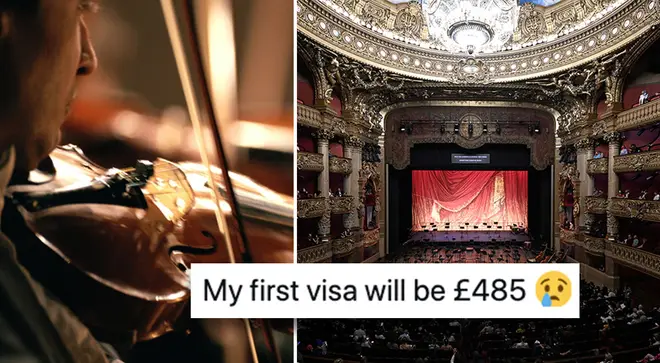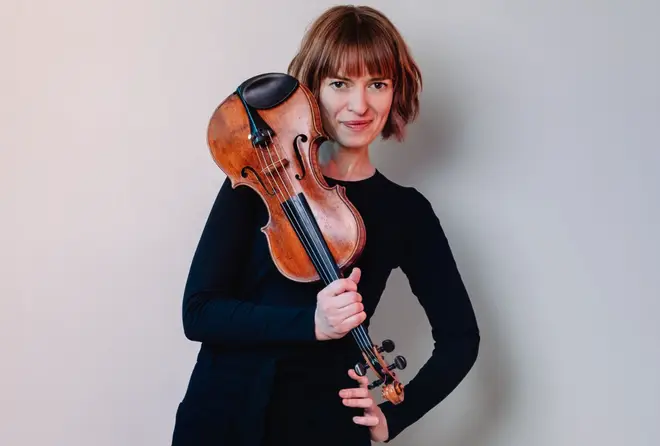On Air Now
Relaxing Evenings with Zeb Soanes 7pm - 10pm
8 February 2021, 16:24 | Updated: 8 February 2021, 16:47

Classical musicians warn of titanic costs and excess paperwork, as British artists begin to navigate the world of touring post-Brexit.
For weeks, artists from all walks of UK cultural life have been sounding the alarm on the profound impact of abandoning visa-free touring in the EU, including Sir Elton John, violinist Nicola Benedetti and actor Dawn French. And today, MPs will debate a petition for a ‘musicians’ passport’ that now has more than 283,000 signatures.
Oliver Dowden, the culture secretary, has called the barriers facing British artists “absurd and self-defeating”, and laid blame with the European Union, who have previously said the UK turned down their standard offer of a visa waiver.
After leading conductor Simon Halsey announced a shocking figure for an upcoming engagement in Spain – £485 for 90 days – we spoke to a number of classical musicians, who told us of their experience so far in taking their instruments and batons to Europe in a post-Brexit world.
Read more: Sir Elton John to ‘go into battle’ in fight for musicians’ visa-free EU touring >
Violinist Fenella Humphreys told us of the painful realities of UK artists being stung by visas and work permits.
I should have been in Germany with my chamber orchestra end of January and start of February for two sets of concerts, but in the end all the Brexit issues alongside Covid problems made it impossible for me to go. I tried to get information or help from my MP at the start of January when it was quite hard to find any definitive information about what I’d need by way of visas or work permits, and he just wrote back telling me I should join the MU. I’m really hoping that somehow the pressure the government is being put under will make them reconsider the EU’s original offer but I’m not holding out much hope.
In the end I didn’t go any further than just finding out what I’d need, but it added up to so much it just wouldn’t have been viable for me to go.
With the work in January, they replaced me with a different leader. For the patch in February they’ve moved it to the summer because the performer directing that programme is also based in the UK. So, I’m keeping fingers massively crossed that by then things will somehow be different.
Read more: British musicians ‘shamefully failed by government’ over lack of visa-free EU travel >

Classic FM spoke to clarinettist Peter Cigleris, who is often employed as an orchestra member in European ensembles, on Monday morning.
Pre-Brexit, it was a simple as jumping on a flight or the Eurostar and then being able to move freely and work. I was offered three concerts as a member of an orchestra based in Benevento Italy, two of which will be in Italy and one in Vienna at the Musikverein. After receiving the contract last week, I went about looking into the details. Thankfully it seems that Italy and Austria are waiving any visa requirements for British nationals as long as their work and stay doesn’t exceed the 90-day period.
Of course, this is still rather early days for everyone as Covid has impacted the ability for many to travel in the first instance and indeed for performances to take place. That said however, I believe the government’s short-sightedness will have a drastic impact. Since the start of the pandemic, what was a thriving arts scene in the UK has been allowed to wither, and this is just another hammer blow. Music is part of the human condition and as such, musicians need to share their voice.
We spoke to conductor Ben Palmer, who received some unique insight from a German orchestra boss.
Planning for this trip to conduct Sinfonietta Rīga was incredibly stressful. After banning UK flights, Latvia allowed them again, just in time. But until I got a message to say I wouldn’t need to quarantine in Rīga due to an exemption from the Latvian Ministry of Culture, it was looking like ten days of isolation, plus four days of the project, plus flights, would take me over the 14-day limit, for which I would need a visa.
In the end, thankfully, neither of these things was problematic. However, pre-Brexit, none of it would have been an issue. Getting on plane at a day’s notice was nothing. Due to the ongoing pandemic, in the coming months opportunities to perform in the EU are likely to be scarce. The thought that it might be Brexit preventing us from accepting work we so desperately need is heartbreaking.
Speaking a few days ago to the boss of my orchestra in Darmstadt, he said that, were I not already installed as chief conductor pre-Brexit, he would never had hired me, because it’s just too complicated now. About 50 percent of my work is – or was – in the EU, and I really fear that many orchestras and promoters may now decide it’s too much hassle and paperwork, and engage someone local.

Beethoven Symphony No. 3 “Eroica” - Deutsche Philharmonie Merck / Ben Palmer
We also heard from horn player Anneke Scott, who has over 30 instruments to navigate taking abroad.
For the last twenty years my freelance work has involved long relationships with a number of orchestras and ensembles based in Europe. I have benefited from being able to work there freely, all I’ve need has been an EU passport and an A1 certificate (a certificate issued by the government to confirm that an individual has paid their National Insurance.). If you needed a horn player at short notice, I was just a train or a flight away.
But now this has all become much, much more difficult.
I have over 30 instruments. I specialise in being able to marry up an appropriate instrument, an appropriate playing style or technique with the music I am playing. It’s part of what makes me employable. The government is saying that we need to now apply for carnets in order to transport our instrument in and out of Europe. So immediately I am faced with more costs and paperwork.
What used to be so simple is now messy and complicated. If you were an orchestral manager, you could continue to book British musicians and be faced with a mountain of paperwork and extra costs, or you could book another musician. I struggle to see how British musicians will be able to compete with our fellow musicians who have retained the right of freedom of movement.
I’m particularly concerned how this is going to impact younger UK-based musicians. I’ve got established connections with groups that I hope will continue. But what reason would an EU ensemble have to go the extra mile to book an unknown young musician, however well recommended, when they have plenty of other young musicians equally needing to get their feet on the first rung of the ladder but without the extra bureaucratic requirements and risks?

Anneke Scott (corno da tirarsi) & Benedict Preece (organ) Johann Sebastian Bach's "Wachet Auf"
Lastly we spoke to British conductor George Jackson, who trained and spent the early years of his opera conducting career in Vienna.
My next job in Vienna will be conducting The Barber of Seville at the Theater an der Wien in 2022. We have a 10-week contract, bringing the total number of days to around 70. In accordance with the new guidelines, third-country citizens are only allowed 30 days of visa and permit-free work in Austria, meaning that, in order to work in the very city that educated me, and the opera house that has nurtured me so warmly in the early part of my career, I have to jump through new hoops of bureaucracy and apply for a visa. We’ve added an expensive and time-consuming paperwork process, just to achieve the same thing that we had before.
I have always been amazed and proud at how adaptable our industry is, and I am sure that institutions will mould themselves into whatever requirements are needed going forwards. But my main worry is ‘opportunity’.
It’s a story that so many artists have from the early parts of their careers: mine was hopping on the Eurostar with 24 hours’ notice to take over a concert for Daniel Harding in Paris, who had cancelled at the last minute due to illness. The orchestra was able to hire me without the question of mobility or legality of work, which is difficult to explore when under the pressure of securing a cancellation.
The fact that there is now a question of whether or not a UK-based artist can make it across the Channel for a last-minute engagement will suffocate and destroy the grand tradition of conductors, singers and instrumentalists taking over projects at the last minute, and confirms that Brexit has essentially transformed a tough-enough profession into something even more difficult.
MPs will discuss the petition for a visa waiver for UK musicians touring in the EU at 4.30pm today, 8 February. Join the discussion using the hashtag #MusiciansPassport.